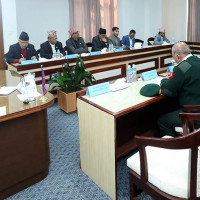- Thursday, 19 February 2026
Strengthening Inclusive Health Governance
As defined by the World Health Organisation (WHO), health is a state of complete physical, mental, and social well-being and not merely the absence of disease or infirmity. The enjoyment of the highest attainable standard of health is one of the fundamental rights of every human being, without distinction of race, religion, political belief, economic condition, or social condition. More importantly, governments have a primary responsibility to ensure health for all by advancing inclusive governance, social participation, adequate health resources, and social measures.
Nepal’s constitution has clearly articulated basic health care as a fundamental health right. In the federal context, national health policy for 2019 primarily aims to ensure access to quality health services for all. The strategic priorities are shaped by national, regional, and international commitments and political declarations related to achieving universal health coverage (UHC) and sustainable development goals (SDGs). Moreover, the policy has a clear focus on multi-sector coordination and partnerships with a range of stakeholders to strengthen inclusive local health governance for health equity and social justice.
Given the socio-political realities and transitioning landscape of the federal health systems, Nepal has been facing critical challenges in terms of coordination across three levels of government for effective implementation of national health policies, strategies, and guidelines at the local level. Moreover, inadequately trained human resources, limited supplies of medicines, including essential logistics, and poor health infrastructure still challenge the ability of local governments to provide basic health care services for those who are poor and socially marginalised in rural and urban areas.
While there are ongoing efforts to implement health policies and strategic priorities at the local level, inclusive governance is critically needed to ensure that no one is left behind in accessing health care services. “The municipality has allocated some additional resources to help those who are very poor, socially marginalised, and indigenous communities. During disasters and pandemics, we provide specific social support and health care services in coordination with other partners," says Dev Chandra Gartaula, chief executive officer at Raksirang Rural Municipality of Makwanpur.
“Social and behaviour change communication interventions can be more effective in improving access to health care services for people who are historically marginalised in their communities. Though there is some progress, local governments must ensure adequate resources, plans, and interventions targeted at the poor and marginalised populations, such as women and children, the elderly, people with disabilities and chronic diseases, sexual or gender minorities, and ethnic and indigenous communities," says Subnima Chepang who is working for a local NGO in Makwanpur.
In recent years, the concept of social participation for health has gained momentum in the planning and implementation of health services. Community engagement aims at empowering people, families, and civil society through inclusive participation in decision-making processes that affect their health and overall social well-being. This fosters mutual respect and trust between people and health institutions and subsequently empowers local governments to be more responsive, equitable, and resilient.
Therefore, inclusive health governance systematically brings people’s voices into policy and decision-making processes. When people feel that their governments listen to their interests and consider their perspectives, they feel more empowered to speak their voice and gain agency over their own health and lives. However, this is a complex process as people’s lived realities are diversely constructed within and across socio-cultural and political contexts.
Undoubtedly, participatory and inclusive health governance contributes to the overarching goal of the UHC by addressing social accountability, diversity, health equity, and social justice. However, the persistent culturally and socially underpinned hierarchies, power relations, and structural inequalities must be addressed to raise the voices of poor, socially marginalised, and vulnerable communities.
“We aim to promote local people’s participation in health care. Our political commitment to health for all is a high-priority agenda, and it is well manifested in our policies and plans for action," says Raj Kumar Malla, chair of Raksirang Municipality. Participatory social spaces are still limited where policymakers and people have chances of interactions, reflections, and raising their voices for actions. This reality limits anchoring people’s voices and their capacity to influence health policies. Obviously, contextual realities form an environment that shapes people’s attitudes towards participation and their ability to participate in health-related policy discussions or other relevant platforms.
On the other side, effective representation of local communities in health management committees or other platforms is important to create a participatory space where people’s different ideas, interests, and health priorities can be broadly discussed and their roles in decision-making accounted for. To this end, enhanced capacities of local governments and civil society organisations are crucial for their meaningful engagement with people, health care providers, and communities in building a resilient and sustainable health system.
“Public health awareness is key to prevention and care. Targeted health interventions to marginalised indigenous communities such as Chepangs or Praja and other vulnerable communities are needed to ensure they have easy access to prevention, treatment, and care,” says Bijaya Kumar Kapari, health coordinator at the municipality. Furthermore, communication is one of the strategic priority areas to capacitate local governments in order to promote social participation in health care delivery. Mostly, local health institutions are well endowed with medico-technical skill sets but often lack adequate capacities to listen, convene, and communicate with people in different social contexts.
It goes without saying that health systems are social systems. In particular, it is also important to explore how social, cultural, economic, and political contexts influence illness, disease, and health care practices within and across societies. An anthropological analysis is needed to explore and enrich our understanding of how medicine is practiced in communities. Understanding illness narratives also requires closer attention to the subjective as well as embodied experiences of people who have been suffering for ages.
The traditional ways of thinking about illness, medicine, health care, and indigenous healing practices are often challenged in the context of globalisation, modernization, and neo-liberal economies. The advancement of biomedicine and medical systems has dramatically dominated modern health care practices in our societies. Nonetheless, an interdisciplinary approach is needed to address wider concerns of medical pluralism, culture, power, gender, and intersecting inequalities in health governance. In this context, contemporary critiques have prompted a renewed emphasis on strengthening inclusive health governance for better health outcomes.
(Bhandari is a health policy analyst and has an interest in anthropology.)



-original-thumb.jpg)











